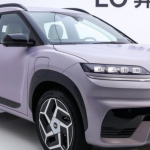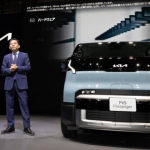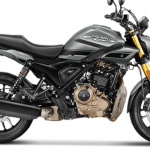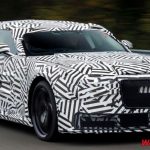The countdown to the IAA Mobility 2025 Auto Show in Munich has begun, and automakers are racing to showcase their vision of the future. Among them, Hyundai has teased a brand-new compact EV concept that has already sparked excitement in the automotive world. Known for its bold designs, cutting-edge technology, and strong commitment to sustainability, Hyundai is once again signaling that it wants to be a leader in the next era of mobility.
This compact EV concept is expected to highlight Hyundai’s strategy for urban-friendly electric cars that blend affordability, sustainability, and modern design. While the company has remained tight-lipped about many details, the teaser gives us enough clues to speculate about what this new EV could bring to the table.

Why a Compact EV Concept Matters for Hyundai
Hyundai has already made a strong mark in the global EV space with models like the IONIQ 5 and IONIQ 6, which impressed buyers with their futuristic designs and long-range capabilities. However, most of these EVs are mid-sized or premium, leaving a big gap in the compact segment.
The compact EV category is one of the most crucial for the future of electrification because:
- Urban Mobility – Compact cars are easier to maneuver in crowded cities.
- Affordability – Smaller EVs generally cost less, making them attractive for budget-conscious buyers.
- Mass Adoption – Entry-level EVs will play a pivotal role in accelerating EV penetration in markets like India, Southeast Asia, and Europe.
By teasing this new concept, Hyundai is signaling that it is ready to enter this high-volume, high-demand space.
First Look: The Design Language
From the teaser images, Hyundai’s compact EV concept showcases a futuristic yet minimalist design language. While full details will be revealed at IAA 2025, here are some standout highlights:
- Closed Front Grille: As with most EVs, the front appears aerodynamically sealed, giving it a clean, modern look.
- Sharp LED Lighting: Slim headlamps with pixel-inspired LED elements, likely borrowed from the IONIQ design philosophy.
- Compact Proportions: Short overhangs, upright stance, and a slightly boxy silhouette, ideal for maximizing interior space.
- Sustainability Touches: Use of recycled or eco-friendly materials is expected in both exterior and interior trims.
The design seems to balance practicality with futuristic appeal, ensuring it looks fresh while still being approachable for everyday buyers.
Expected Powertrain and Battery Options
While Hyundai has not revealed specific battery details, the compact EV is expected to focus on efficiency and affordability rather than sheer performance.
- Battery Capacity: Likely to range between 35 kWh to 45 kWh, offering a real-world driving range of 300–400 km.
- Charging: Support for DC fast charging, potentially recovering 80% charge in under 30 minutes.
- Performance: Modest electric motor output, tuned for city driving with smooth acceleration and instant torque.
By prioritizing practicality over luxury specs, Hyundai ensures this EV is positioned as a daily commuter that works for urban families and first-time EV adopters.
Technology and Interior Features
Hyundai has been a frontrunner in offering connected and smart features across its lineup, and the new compact EV concept is expected to carry the same DNA. Some features we can expect:
- Minimalist Cabin Design: A clean, open dashboard with two large digital screens for infotainment and driver information.
- Connected Car Tech: Hyundai’s latest Bluelink system with remote monitoring, OTA updates, and smartphone integration.
- Smart Safety Features: Autonomous emergency braking, lane-keeping assist, blind-spot monitoring, and possibly entry-level ADAS features.
- Practical Interiors: Despite being compact, Hyundai may optimize cabin space with flat floors, foldable rear seats, and modular storage areas.
- Sustainable Materials: Upholstery made from recycled plastics, eco-friendly fabrics, and bio-based alternatives.
The focus seems to be on creating a comfortable, smart, and eco-conscious driving experience.

Hyundai’s Sustainability Goals and EV Strategy
This concept is not just another EV; it’s part of Hyundai’s larger vision to achieve carbon neutrality by 2045. Hyundai has consistently emphasized the use of green energy solutions, sustainable manufacturing, and recyclable materials.
The compact EV aligns with this strategy because:
- Lower Environmental Footprint – Smaller EVs consume less energy in both production and use.
- Accessibility – Affordable EVs can bring more people into the eco-mobility fold.
- Global Strategy – Compact EVs are highly relevant in markets where small cars dominate, such as Europe, India, and Southeast Asia.
By unveiling this concept at IAA 2025, Hyundai is also reinforcing its role as a global EV leader.
Competing in a Crowded Segment
Hyundai’s compact EV will face stiff competition. In Europe and Asia, the small EV segment is already heating up with models like:
- Renault 5 EV
- Volkswagen ID.2all (upcoming)
- MG Comet EV (for Asia)
- Tata Punch EV (India)
Hyundai’s advantage lies in its global reputation for reliability, design excellence, and after-sales support. If priced correctly, the compact EV could become one of the strongest contenders in the segment.
Expectations from the Official Reveal at IAA 2025
When Hyundai fully unveils the compact EV at IAA 2025, here are the key areas enthusiasts and buyers will be watching:
- Final Design – Will it retain the bold styling from the teaser or shift to a more production-ready look?
- Pricing Strategy – How affordable will Hyundai make it to compete with rivals?
- Range and Charging – Will it cross the 400 km mark on a single charge?
- Market Launch Plans – Which countries will get it first – Europe, Asia, or a global rollout?
- Production Timeline – Will it hit showrooms by 2026, or remain a long-term concept?
The answers to these questions will define just how successful Hyundai’s new compact EV will be.
Why This Concept Is a Big Deal
- For Hyundai: It cements the brand’s position as a leader in electrification, not just in premium spaces but also in mass-market segments.
- For Consumers: It opens the door to affordable, practical EV ownership with Hyundai’s trusted badge.
- For the Industry: It pushes other automakers to speed up innovation in the compact EV segment.
Conclusion
The Hyundai Compact EV Concept teased ahead of IAA 2025 is more than just a design study – it represents Hyundai’s commitment to creating sustainable, practical, and stylish solutions for urban mobility. With futuristic design cues, smart technology, eco-friendly materials, and a focus on affordability, this upcoming EV could be a game-changer in the compact car market.
As the official unveiling approaches, the world eagerly awaits to see how Hyundai translates this vision into a production-ready model. If successful, it could set new standards for compact EVs worldwide and accelerate the adoption of electric mobility across urban landscapes.
The road to the future is electric, and Hyundai is making sure it leads from the front.

Hello, my name is Muskan Kumari and I am an experienced Digital Marketer. I have been blogging for the last 3 years and I have special interest in SEO. Here I give you easy bikes and writes easy-to-understand reviews and news about the latest bikes, helping readers choose the best options.. My aim is to always provide you with accurate, new and useful information.










